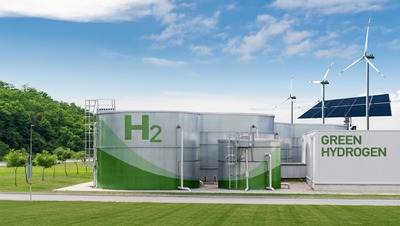As governments and manufacturers continue their search for clean, sustainable energy solutions, green hydrogen is proving a viable option that can help decarbonise the planet. Green hydrogen is produced through the electrolysis of water using renewable sources of electricity and has the potential to significantly reduce CO2 emissions. Throughout the production process, the purity and quality of hydrogen must be monitored to ensure it meets regulatory standards. This evaluation is conducted through gas analysis.

Hydrogen is a versatile energy carrier found in abundance across the universe. It can be used to generate electricity and power, function as a substitute for fossil fuels in heavy industries, and many other applications. However, the negative impact of using hydrogen is that conventional production methods result in CO2 emissions. Green hydrogen, on the other hand, offers a cleaner alternative as it is produced through the electrolysis of water using renewable sources of electricity. This process does not produce CO2, thus offering a solution to reach net zero by significantly reducing carbon emissions.1 Throughout the production process, the purity and quality of hydrogen must be monitored to ensure it meets regulatory standards. This evaluation is conducted through gas analysis.
Let’s explore the importance of gas analysis in water electrolysis and its role in enabling the production of green hydrogen.
Water Electrolysis and Its Role in Green Hydrogen Production
Water electrolysis is the process of splitting water molecules into hydrogen and oxygen gases using an electric current. It consists of two electrodes, an anode and a cathode, separated by an electrolyte. When an electric current is passed through the water, hydrogen gas is generated at the cathode, while oxygen gas is released at the anode. This process can be powered by renewable sources of electricity, such as wind or solar, making it a sustainable method for green hydrogen production.
Gas Analysis in Water Electrolysis
So how does gas analysis factor into this process? Gas analysis refers to the measurement and analysis of the composition, concentration, and properties of gases. In the context of water electrolysis, gas analysis plays a critical role in monitoring and controlling the process and is considered a long-term solution for sustainable hydrogen production.
By analysing the composition of the gases produced, such as hydrogen and oxygen, operators can ensure the efficiency and effectiveness of the electrolysis system. If any errors or deviations from the expected values are detected, they can be promptly corrected. This real-time feedback enables process optimisation, leading to increased efficiency and hydrogen yield. Additionally, maintaining high purity levels is crucial for the successful utilisation of green hydrogen in various applications, such as fuel cells and industrial processes.
Mass Spectroscopy (MS) and Other Gas Analysis Techniques
Mass spectrometry is used to identify and quantify gas components based on their mass-to-charge ratio. When hydrogen is produced, gas analysis techniques such as MS are employed to monitor the hydrogen concentration in real time. As a result, process efficiency and optimisation can be monitored, and electrolysis processes can be further developed.
Gas chromatography (GC) is another widely used technique in gas analysis. It involves the separation of gas components based on their differential interactions with a stationary phase and a mobile phase. GC can provide measurements of gas composition and concentration but with a much lower frequency of data acquisition.
Hiden Analytical’s Gas Analysis Products
Hiden Analytical is an industry-leading gas analyser manufacturer that offers specialist solutions to clients worldwide. Our notable products used for green hydrogen applications include the following mass spectrometers: QGA, HPR-20 and HPR-40 series.
Learn more about our Products for Electrolysis & Green Hydrogen Applications or contact a member of Hiden Analytical today.
References
- https://netzeroclimate.org/what-is-net-zero/

